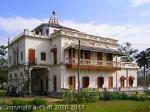Rabindranath Tagore
Rabindranath Tagore
Born: 1861
Death: 1941
Biography:
The works of Rabindranath Tagore consist of poems, novels, short stories, dramas, paintings, drawings, and music that Bengali poet and Brahmo philosopher Rabindranath Tagore created over his lifetime.
Tagore's literary reputation is disproportionately influenced very much by regard for his poetry; however, he also wrote novels, essays, short stories, travelogues, dramas, and thousands of songs. Of Tagore's prose, his short stories are perhaps most highly regarded; indeed, he is credited with originating the Bengali-language version of the genre. His works are frequently noted for their rhythmic, optimistic, and lyrical nature. However, such stories mostly borrow from deceptively simple subject matter — the lives of ordinary people and children.
At sixteen, Tagore led his brother Jyotirindranath's adaptation of Molière's Le Bourgeois Gentilhomme. At twenty he wrote his first drama-opera: Valmiki Pratibha with an exuberance of vitality and spontaneity; these characteristics were intimately connected with Tagore's life in the common villages of, among others, Patisar, Shajadpur, and Shilaida while managing the Tagore family's vast landholdings. There, he beheld the lives of India's poor and common people; Tagore thereby took to examining their lives with a penetrative depth and feeling that was singular in Indian literature up to that point. In particular, such stories as "Kabuliwala" ("The Fruitseller from Kabul", published in 1892), "Kshudita Pashan" ("The Hungry Stones") (August 1895), and "Atottju"("The Runaway", 1895) typified this analytic focus on the downtrodden.
More...
Wikipedia link: Click Here

